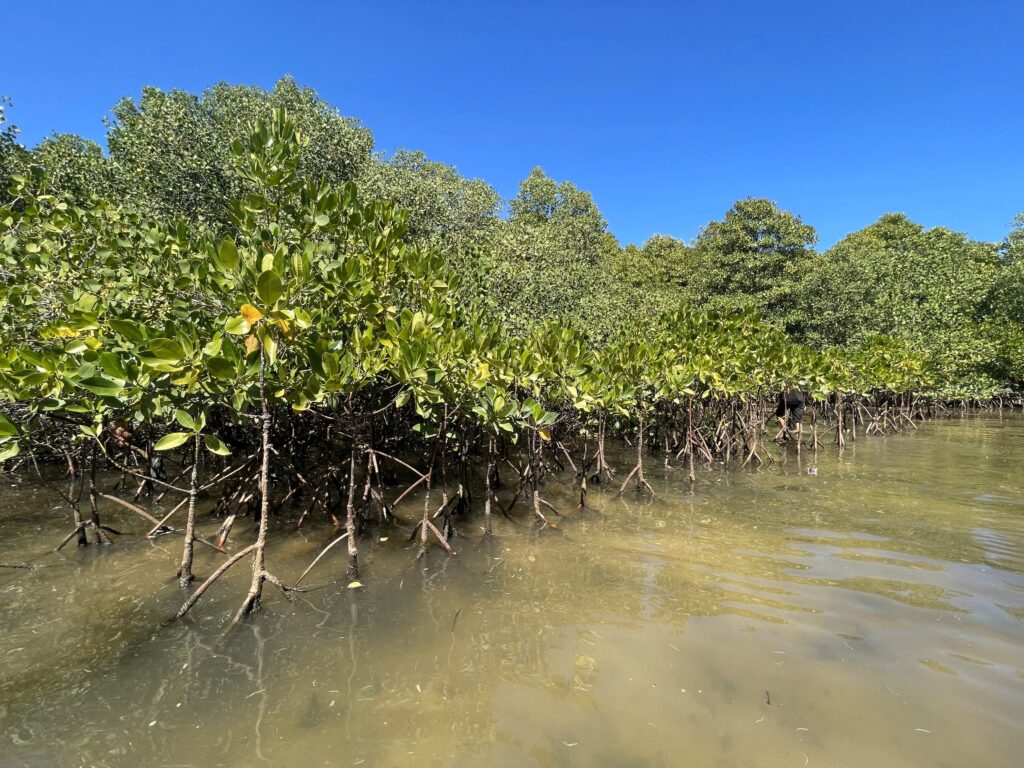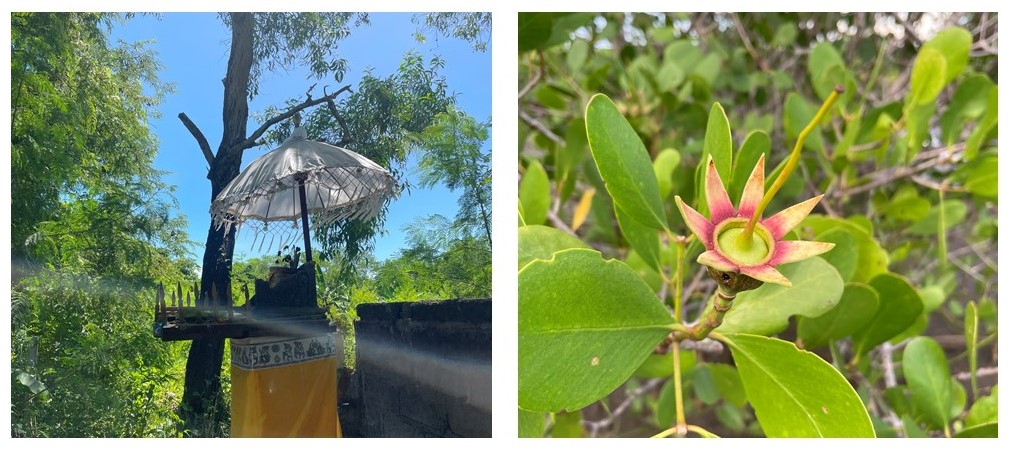
Mangrove Guardians of Bali: Embracing Tri Hita Karana for Sustainable Futures
Ari Bima Putra
(Kookmin University)
As the sun rose over the serene shores of Bali, I found myself wading through knee-deep muddy waters, surrounded by the tangled roots of mangrove trees. In this unique and essential ecosystem, I uncovered stories of resilience and hope. From the fisherman who depends on the mangroves for his livelihood to the vibrant biodiversity within these coastal forests, my journey revealed the profound connections between nature and human existence.

One of the rehabilitation areas of the mangrove forest in Nusa Dua, Bali.
 This is a story of how mangroves are more than just trees—they are protectors of biodiversity, and guardians in the fight against climate change. Join me on a journey through Bali’s mangrove forest, where spirituality, community, and nature converge in harmony, guided by the timeless principles of Tri Hita Karana.
This is a story of how mangroves are more than just trees—they are protectors of biodiversity, and guardians in the fight against climate change. Join me on a journey through Bali’s mangrove forest, where spirituality, community, and nature converge in harmony, guided by the timeless principles of Tri Hita Karana.
A Research Journey in Bali
In recent times, there has been a growing interest in mangrove forests, recognized for their multifaceted ecosystem services encompassing coastal primary production, water quality regulation, pollution control, habitat provision for aquatic and terrestrial organisms, support for biodiversity and the most important is the contribution to climate change adaptation and mitigation through immense carbon storage and coastal biogeochemical cycles[1].
In March 2024, I had the opportunity to conduct a mangrove field survey in Ngurah Rai Grand Forest Park in Bali, Indonesia. Ngurah Rai Grand Forest Park, covering 1,300 hectares, hosts around 33 mangrove species[2]. This research was conducted in collaboration between Kookmin University, Center for International Forestry Research (CIFOR), and National Institute of Forest Science of Korea. We also engaged with the local government and researchers from Udayana University and Dhyana Pura University. Our goal was to examine the mangrove forest’s biodiversity and carbon stock capacity in Ngurah Rai Grand Forest Park.

Various measurements were conducted during the field survey in mangrove forests including plot preparation (left), soil measurement (middle), and walk to the study area (right).
During our intensive survey, many interesting aspects caught my attention. I noticed that fellow Balinese researchers regularly performed prayers by presenting offerings (locally known as Canang Sari) to the temples or small shrines near our study plot before starting the survey. Curious, I inquired about their practice, and this led me to discover Tri Hita Karana, the sacred Balinese philosophy.
Tri Hita Karana: The Sacred Balance
The Balinese philosophy of Tri Hita Karana emphasizes the balance between three causes of well-being: harmony with God, harmony among people, and harmony with nature[3]. This philosophy is not only the foundation of Balinese culture but also a guiding principle for sustainable living and environmental protection, embraced in daily life.
The spiritual connection between the Balinese people and their environment is profound. Mangroves are considered sacred, and their presence is interconnected with religious practices and rituals. Many Hindu temples and shrines are located within the mangrove forest, promoting conservation as these temples are considered sacred places. Presenting offerings before starting work underscores the deep spiritual connection with nature, viewing the mangroves not just as ecological assets but as entities deserving respect. I believe that this was also part of the local wisdom to keep away from destroying the mangrove forests. This spiritual dimension adds a layer of cultural richness to mangrove conservation.
Community efforts are at the heart of mangrove conservation in Bali. Local initiatives bring together different generations, blending traditional knowledge with modern practices. Collaborative mangrove rehabilitation initiatives between local communities, local and national governments, and international organizations highlight the power of unity in addressing environmental challenges. Ngurah Rai Grand Forest Park, once destroyed due to the development of fish ponds, has been successfully rehabilitated[2]. This restoration was showcased to world leaders during the 2022 G20 Summit[4] and the 10th World Water Forum as a successful collaborative initiative, serving as a model that can be replicated in other areas[5].

A Hindu temple located near our survey plot (left) and a young Sonneratia fruit (right).
If you plan to visit Bali, you will see the lush green mangrove forests near the airport. You can also visit some mangrove forest ecotourism sites that have convenient trails to enjoy the beauty of this forest!
Call to Action
In line with the theme of the upcoming IUFRO World Congress 2024, “Forest and Society towards 2050,” Bali’s vibrant local community movement, along with their local wisdom, stands as a testament to the innovative spirit to tackle global environmental challenges.
As I reflect on my journey through Bali’s mangrove forests, I am inspired by the harmonious interplay of spirituality, community, and nature encapsulated in Tri Hita Karana. These sacred principles not only guide the Balinese in their daily lives but also offer a timeless blueprint for sustainable living.
The IUFRO World Congress 2024 provides an ideal platform to share these lessons and inspire global action towards a more sustainable and harmonious future. I encourage readers to explore and promote traditional knowledge and local wisdom in their own countries, which can be a foundation for preserving nature and ecosystems for the future.
Reference
[1]https://www.fao.org/forestry/mangrove/ecosystem-services/en#:~:text=Mangroves%20effectively%20attenuate%20the%20energy,this%20varies%20enormously%20between%20sites.
[2]https://media.worldwaterforum.org/en/contents/siaran-pers-660047517afb1/siaran-pers-world-water-forum-ke-10-tahura-mangrove-ngurah-rai-keberhasilan-restorasi-berkelanjutan-indonesia-6649f15ce9e90.
[3]Arnyana I B P & Utami I A M I. 2021. The Implementation of Tri Hita Karana Culture-Based Character Education at Pasraman Budi Pekerti, Kemenuh Village, Bali. Advances in Social Science, Education and Humanities Research [63].
[4]https://setkab.go.id/en/g20-leaders-visit-ngurah-rai-forest-park-in-bali/.
[5]https://setkab.go.id/en/2024-wwf-president-jokowi-showcases-mangrove-conservation-to-heads-of-state-delegates/


